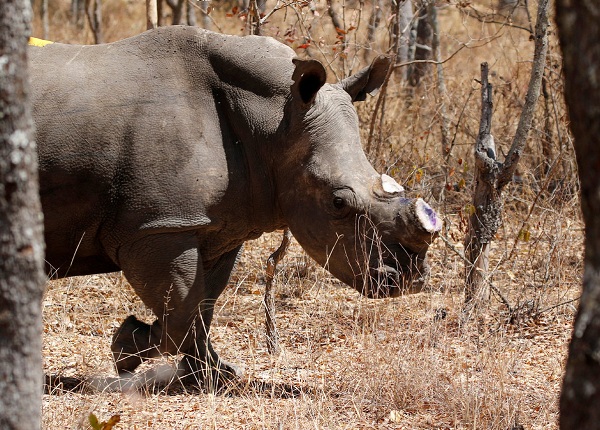China, Vietnam to strengthen cooperation against wildlife smuggling


A white female rhino. [Photo/Agencies]
A China-Vietnam customs wildlife crime enforcement workshop was held in Shenzhen, Guangdong province, from May 10 to May 12.
More than 50 representatives from the Anti-Smuggling Bureau of the General Administration of Customs, eight regional customs departments in the country, the Customs and Excise Department of Hong Kong Special Administrative Region, and the Anti-Smuggling and Investigation Department of the General Department of Vietnam Customs participated in the workshop co-organized by China customs and the International Fund for Animal Welfare, an international conservation organization. It aimed to further enhance anti-wildlife trafficking coordination and cooperation between China and Vietnam, especially engaging with customs of Hong Kong SAR to strengthen regional intelligence sharing and coordinated enforcement actions.
Wildlife crime is a global organized crime that severely threatens the survival of thousands of endangered species, and therefore demands enforcement efforts from countries along the entire trade chain. With Chinese customs increasingly taking stringent measures against wildlife trafficking in recent years, wildlife crime syndicates have moved to smuggling wildlife parts and products via the vast border regions between China and its neighboring countries.
China implemented a complete ban on commercial trade in ivory on Jan 1 last year, showing firm commitment in combating wildlife crime and conserving endangered species. According to China customs, the ASB tackled 340 endangered wildlife trafficking cases in 2017 and 2018. Since the beginning of 2019, the ASB has filed investigations on 182 cases of smuggling of endangered species and their products, 53 of which involved ivory. A total of 27 criminal syndicates were disrupted, 171 suspects arrested and 500.5 metric tons of endangered species products impounded, 8.48 tons of which were ivory and its products.
Enforcement agencies in Hong Kong SAR and Vietnam have also been playing essential roles in disrupting cross-regional wildlife trafficking. A report issued by Hong Kong Wildlife Trade Working Group in January this year showed that over the last decade, the diversity of endangered species imported into Hong Kong rose by 57 percent, and the estimated value of the trade increased by 1,600 percent.
On Jan 16 this year, China customs and Hong Kong SAR customs seized a massive haul of 8,268 kilograms of pangolin scales and 2,070 kilograms of ivory in a joint operation. Vietnam has been a hotspot country for wildlife trafficking, and Vietnam customs has made multiple large seizures in recent years. On March 26 of this year, the authorities there made a record high seizure in recent years with 9.12 tons of ivory confiscated.
At the workshop, customs officials from China and Vietnam agreed to develop a more structured intelligence sharing mechanism and a joint operation plan to strengthen regional counter wildlife trafficking efforts.
"To stop the slaughter of endangered species, we have to break every link on the trade chain — from poaching to trafficking to demand," said Grace Ge Gabriel, IFAW Asia regional director. "IFAW will continue to work with China customs to facilitate regional and cross-regional enforcement collaboration."
MOST POPULAR
- 1 $39.7 billion worth of deals inked at Airshow China
- 2 China announces tax relief measures to stabilize real estate sector
- 3 A look at China's economy in October, 2024
- 4 Public holiday extension announced
- 5 China's NEV annual production hits 10 million milestone amid global carbon reduction efforts
Editors' Picks
 Infographic:
Golden jubilee of China-Brazil relations
Infographic:
Golden jubilee of China-Brazil relations
 Infographic:
A look at China's economy in October, 2024
Infographic:
A look at China's economy in October, 2024
 Infographic:
G20 at a glance
Infographic:
G20 at a glance
 Video:
Peru sees new port open
Video:
Peru sees new port open



